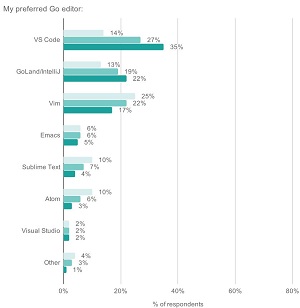News
Golang Coders Choose VS Code
A previous survey of the Go programming language community found that Visual Studio Code barely beat Vim as the code editor of choice, and the new edition shows the race isn't even close anymore.
On pace to seemingly eating the software development world, VS Code's increasing popularity has been documented here many times, with the latest survey of the community surrounding the open source, Google-created language (golang.org) just piling on.
Just published this week, the results are actually from a survey conducted last year, so the post is titled "Go 2018 Survey Results."
"Last year, VS Code edged out Vim as the most popular Go editor among survey respondents," it says. "This year it significantly expanded its lead to become the preferred editor for over one-third of our survey respondents (up from 27 percent last year). GoLand also experienced strong growth and is now the second most-preferred editor at 22 percent, swapping places with Vim (down to 17 percent). The surging popularity of VS Code and GoLand appear to be coming at the expense of Sublime Text and Atom."
 [Click on image for larger view.] Preferred Go Editors (source: golang.org).
[Click on image for larger view.] Preferred Go Editors (source: golang.org).
Go programmers reported no difference in their satisfaction levels for their preferred editors, but fill-in-your-own-answer responses indicated what areas they'd like to see improved:
- Improved debugging support (for example: "Live debugging," "Integrated debugging" and "Even better debugging")
- Improved code completion ("autocomplete performance and quality," "smarter autocomplete")
- Better integration with Go's CLI toolchain
- Better support for modules/packages
- General performance improvements
Other more general survey highlights include:
- Half of survey respondents are now using Go as part of their daily routine
- The most common uses for Go remain API/RPC services and CLI tools
- Web development remains the most common domain that survey respondents work in, but DevOps is coming on strong
- Many Go developers use more than one primary OS for development
- Survey respondents appear to be shifting away from on-premises Go deployments toward containers and serverless cloud deployments
Go itself is a popular item in the programming community, with various surveys showing developers want to learn it in 2019 and it pays the best (Dice and Stack Overflow). Also, Microsoft last August embraced the language for Azure cloud development.
The results come from 5,883 survey respondents from 103 different countries.
About the Author
David Ramel is an editor and writer at Converge 360.